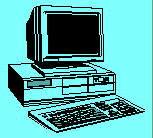COMPARED WITH

INTERNET EMAIL & the
WORLD WIDE WEB
Packet Radio was adapted by amateurs
from existing commercial computer communications streams in the early 80's.
Today it is used by amateurs to send messages
from their computers via their radios around
the world
without the expense of using the Internet
and systems such as world wide web or E-Mail.
Amateur Packet Radio is normally based around 1200 baud
radio modems connected via VHF amateur transceiver's.
VHF communications are typically limited to 'line of sight' distances,
thus amateurs rely on 'store and forward' techniques to relay data
over longer distances.
Other long distance digital communications are usually achieved
either via HF (Short Wave) radios and slower modems (around 300
baud)
or via Amateur Satellites using 9600 baud or faster.
The major uses for amateur packet radio are in sending electronic
messages
between amateurs around the world, or just across your own city,
these messages either being bulletins (broadcast to everyone)
or personal type messages (similar to UseNET Internet News and Internet
E-Mail).
Packet radio is also used by the more adventurous amateurs
for some relatively sophisticated computer networking experiments
via radio connections, and has similar abilities to the Internet.
The amateur networks, however, are not connected directly to the
Internet,
due to strict regulations on who can control an amateur radio transmitter,
and what is sent over an amateur transmitter.
The major differences between Internet and
Amateur Packet Radio
are that the Internet relies on other people's
transmission links and facilities,
which people must pay for, where amateur packet
radio does not
(for the most part) use any wires or wired
commercial networks.
Amateur Packet Radio is generally slower than todays' modern telephone
modems,
more as a result of what many amateurs are currently doing with
packet radio
rather than what it is capable of. Indeed, there is scope within
Amateur Packet Radio
to construct data links capable of running 2Mbit/s, something that
is not possible via phone lines.
Contributed by Grant VK5ZWI
See also WARG & WAADCA
![]()
WIA WA - AR Guide - Packet Radio compared
with the Web
![]()
AR Guide index - Clubs
WA -
WA index